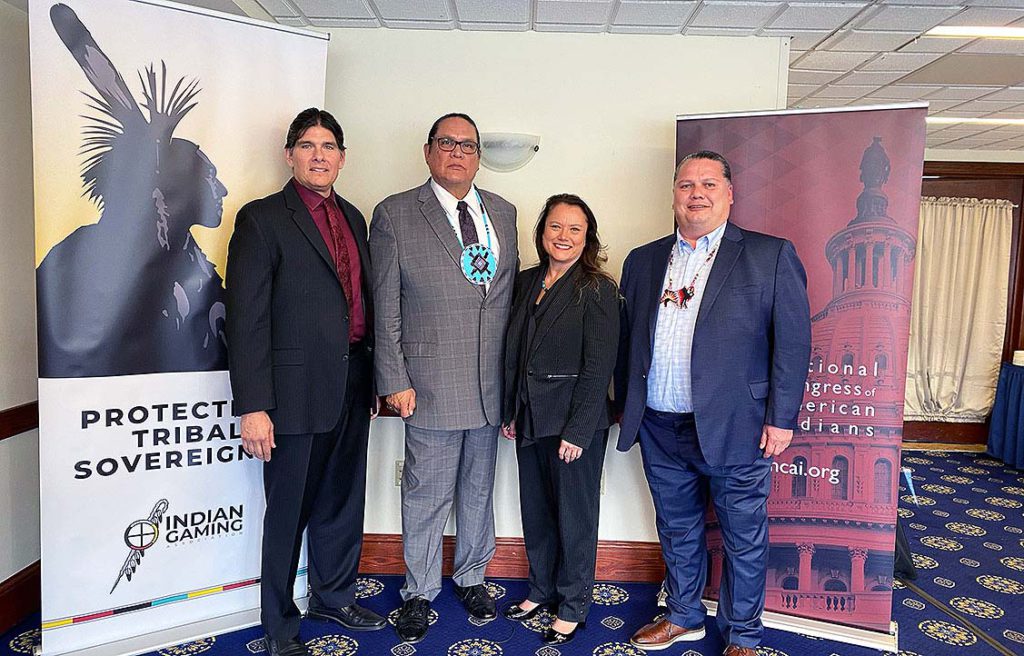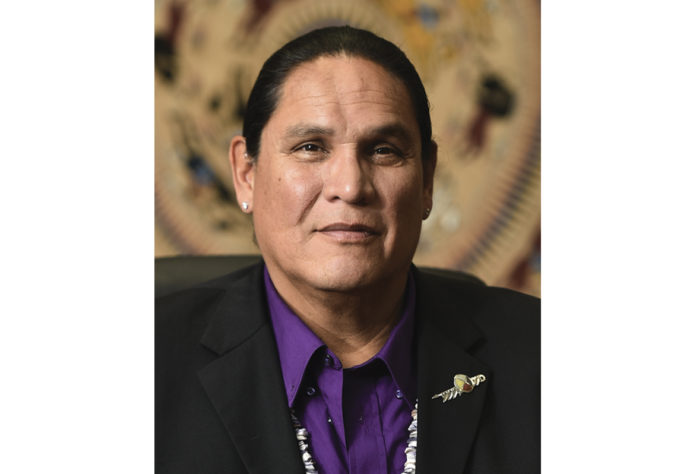by Ernest L. Stevens, Jr.
The Indian Gaming Association recently hosted a joint press conference with the National Congress of American Indians to announce the reactivation of the IGA-NCAI Task Force at the National Press Club in Washington, D.C. The primary mission of the Task Force remains the protection of tribal sovereignty and the inherent right of tribal governments to conduct gaming to generate revenue to support their communities. The need to reinvigorate and refocus the Task Force comes in the face of unprecedented U.S. Supreme Court attacks on tribal sovereignty.
At the request of tribal leaders nationwide, I joined NCAI President Fawn Sharp to unite the two largest tribal advocacy organizations to start a national dialogue and to develop strategy to confront these challenges and identify opportunities for tribal governments to assert their inherent sovereign rights over Indian lands. The Task Force will hold its first official meeting at the NCAI Mid-Year Convention on the Shakopee Mdewakanton Sioux Community homelands on June 4-8, 2023.
It’s difficult to recall a more challenging time for Indian Country. We see the growing environmental destruction of our lands, natural resources, and sacred places from climate change. Native women and men continue to suffer from the scourge of murdered and missing relatives throughout Indian Country. Suicide is the second leading cause of death – 2.5 times the national rate – for Native youth between the ages of 15 to 24. Native youth continue to be overrepresented in the foster care system at more than 2.4 times the general population.
The most ominous threats facing tribal governments come from a United States Supreme Court that is increasingly willing to ignore the U.S. Constitution, federal law, policy, and its own legal precedent. The Court is actively weighing the constitutionality of whether federal laws designed to uphold the government’s legal obligations to Indian tribes are unconstitutionally based on “race” and not the political or
governmental status of Native Nations.

In June of 2022, the Supreme Court issued its decision in Oklahoma v. Castro-Huerta, which overturned two centuries of federal Indian law, granting state courts jurisdiction over crimes committed by non-Indians in Indian Country. The decision is a unilateral grant of power from the judicial branch to state governments over Indian lands. The case is one of an increasing list of federal court challenges to longstanding tenets of federal Indian law.
A blistering dissent in the Castro-Huerta case, authored by Justice Neal Gorsuch, exposed the extent to which the Court’s majority broke from normal legal standards.
“[T]he Court announces that, when it comes to crimes by non-Indians against tribal members within tribal reservations, Oklahoma may ‘exercise jurisdiction.’ But this declaration comes as if by oracle, without any sense of the history recounted above and unattached to any colorable legal authority. Truly, a more ahistorical and mistaken statement of Indian law would be hard to fathom.
Tribes are sovereigns…. Tribal sovereignty means that the criminal laws of the States ‘can have no force’ on tribal members within tribal bounds unless and until Congress clearly ordains otherwise.
After all, the power to punish crimes by or against one’s own citizens within one’s own territory to the exclusion of other authorities is and has always been among the most essential attributes of sovereignty.
This Court may choose to ignore Congress’s statutes and the Nation’s treaties, but it has no power to negate them. The Court may choose to disregard our precedents, but it does not purport to overrule a single one. As a result, today’s decision surely marks an embarrassing new entry into the anticanon of Indian law.”
Native legal scholars agreed with Justice Gorsuch, calling out the Castro-Huerta Court’s stunning hypocrisy and intellectual dishonesty, full of broad sweeping statements that lack any historical context or regard for settled law. The Castro-Huerta Court inserts, out of whole cloth, a new 10th Amendment doctrine into Indian law. This is judicial activism at its worst.
The IGA-NCAI Task Force will develop policy proposals to address this deeply misguided decision, and we will educate the public and policy makers about the true history of the tribal-federal government-to-government relationship. We cannot let the Supreme Court strike at tribal sovereignty with the simple stroke of a pen.
It is an undisputed fact that Native Nations pre-date the formation of the United States. Prior to contact, Indian tribes were independent, self-governing entities vested with full authority and control over their lands. Upon its formation, the United States acknowledged the sovereign authority of Indian tribes, entering into hundreds of treaties with tribal governments to secure trade agreements, establish peace alliances, and reach promises on related governmental powers. The U.S. Constitution acknowledges these treaties and the status of Indian tribes as distinct governments. The Constitution provides that “Congress shall have power to … regulate commerce with foreign nations, and among the several states, and with the Indian tribes.” This clear text establishes the framework for the federal government-to-government relationship with Indian tribes.
The IGA-NCAI Task Force will work to hold the United States accountable to the solemn promises and enshrined in our treaties and the governmental status of Indian tribes reaffirmed in the U.S. Constitution. This Task Force will call upon Congress and the President to utilize every available tool to protect tribal government self-determination, treaty rights, and the ability of Indian tribes to exercise authority over Native lands.
The work of the Task Force is more urgent than ever. Sovereignty and our sacred treaty rights are under direct attack. Working together, tribal nations will make a difference. When we are united, Indian Country is truly unstoppable. Indian Country will meet these challenges with a collective voice. Together, we will emerge stronger.
Ernest L. Stevens, Jr. is Chairman of the Indian Gaming Association. He can be reached by calling (202) 546-7711 or visit www.indiangaming.org.

















































